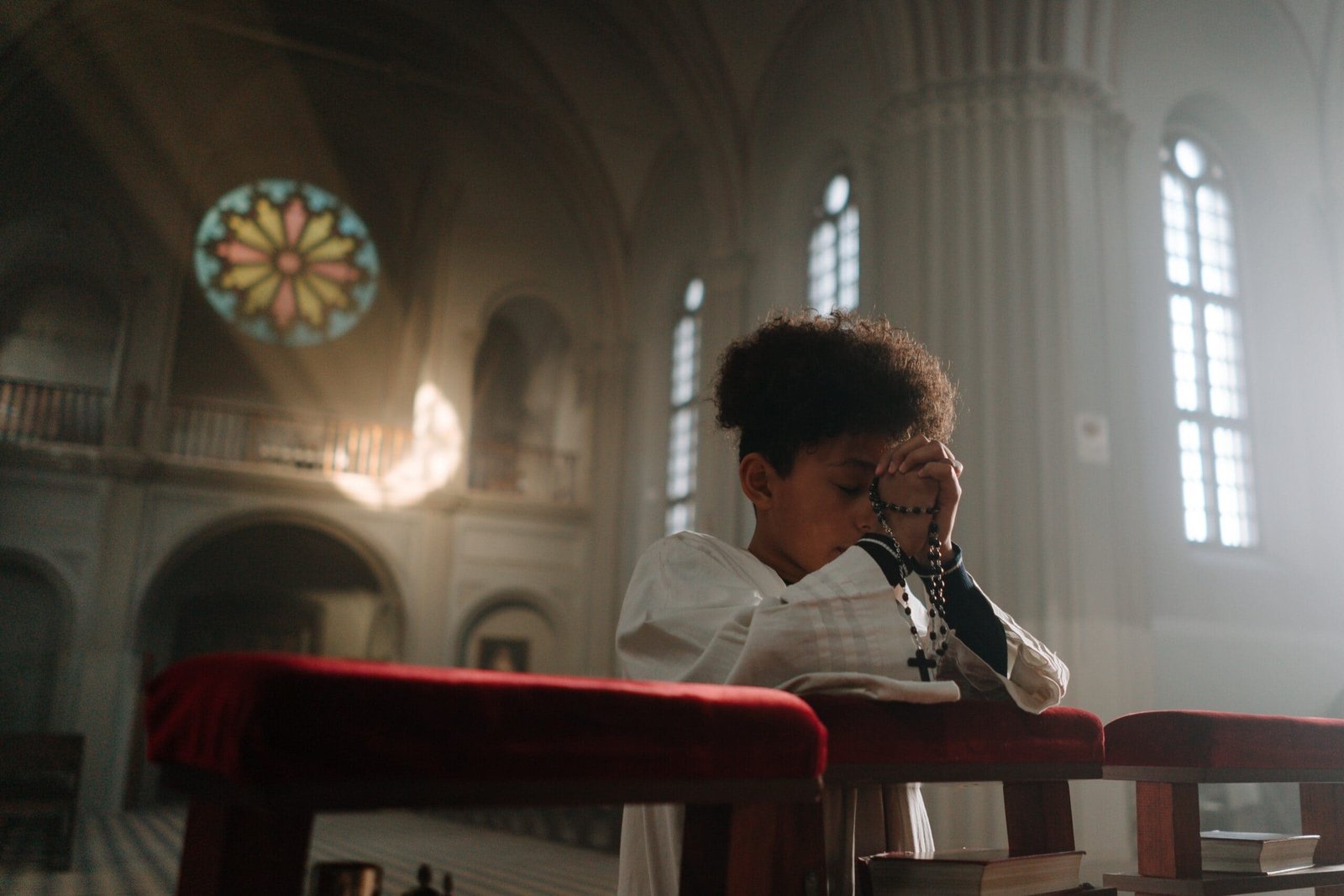Catholic Parenting: Nurturing Faith and Values in the Family Journey
Catholic Parenting is a topic that explores the unique approach to raising children from a Catholic perspective. With a focus on instilling strong values and faith in their little ones, Catholic parents navigate the joys and challenges of parenting through the lens of their religious beliefs. Whether it’s incorporating prayers into daily routines or teaching moral teachings, this article provides insights and guidance to help Catholic parents nurture their children’s spiritual growth while navigating the complexities of modern family life.
Principles of Catholic Parenting
Teaching Catholic Values
As a Catholic parent, one of your primary goals is to instill Catholic values in your children. This involves teaching them about the importance of faith, love, compassion, and forgiveness.
By emphasizing these values from an early age, you are laying a strong foundation for their spiritual growth. You can do this by incorporating religious teachings into everyday conversations, reading Bible stories together, and discussing moral dilemmas as a family. By actively living out these values in your own life, you serve as a positive role model for your children to emulate.
Promoting Prayer and Worship
Another essential aspect of Catholic parenting is promoting prayer and worship within your family. By fostering a culture of prayer, you are helping your children develop a personal relationship with God.
Encourage regular prayer, both as a family and individually. Teach your children traditional Catholic prayers, such as the Our Father and the Hail Mary, and explain their meaning. Encourage them to express their joys, worries, and gratitude to God through prayer. Attending Mass as a family on Sundays and Holy Days is also crucial in nurturing a sense of community and reverence for the Eucharist.
Developing Morality and Virtue
Catholic parenting involves guiding your children towards developing a strong moral compass and virtue. Teach them about the Ten Commandments and the Beatitudes, explaining how they apply to their daily lives. Help them understand that making moral choices may not always be easy but is necessary for living a virtuous life.
Instill virtues such as kindness, patience, honesty, and humility through daily interactions and discussions. Teach them to differentiate between right and wrong, and encourage them to make decisions based on Catholic teachings and values. By consistently modeling moral behavior and addressing ethical dilemmas, you are shaping your children’s character and fostering their spiritual growth.
Sacraments and Catholic Parenting
Baptism
Baptism is the first sacrament your child will receive as a Catholic. It is through this sacrament that they are cleansed of original sin, welcomed into the Church, and become a member of the Body of Christ. As a Catholic parent, it is your responsibility to ensure that your child is baptized as soon as possible after birth.
This involves scheduling the baptism with your parish, selecting godparents who will support your child’s faith journey, and actively participating in the baptismal preparation process. Emphasize to your child the significance of their baptism and continue to nurture their faith through prayer, religious education, and active participation in the Church community.

First Holy Communion
First Holy Communion is a significant milestone in a Catholic child’s life. It is the sacrament in which they receive the body and blood of Jesus Christ for the first time. As a parent, your role is to prepare your child for this sacrament by teaching them about the Real Presence of Jesus in the Eucharist and the importance of receiving it with reverence and gratitude.
Attend the sacramental preparation classes offered by your parish and actively engage in discussions about the significance of the Eucharist. Encourage your child to pray and develop a personal relationship with Jesus, fostering a deep understanding of the sacrament.
Confirmation
Confirmation is the sacrament in which your child receives the fullness of the Holy Spirit and becomes a fully initiated member of the Catholic Church. As a parent, your role is to support your child’s decision to receive this sacrament and help them prepare both spiritually and intellectually.
Encourage them to deepen their understanding of the Catholic faith through religious education classes, personal study, and discussions. Help them choose a sponsor who can guide them on their faith journey. Additionally, encourage your child to seek out opportunities for service and outreach, as Confirmation is a call to live out their faith in the world.
Discipline and Catholic Parenting
The Importance of Discipline
Discipline plays a crucial role in Catholic parenting as it helps children develop self-control, responsibility, and respect for others. However, it is important to approach discipline with love and understanding rather than punishment. Discipline should aim to correct behavior, teach lessons, and guide children toward making moral choices.
Through discipline, you can help your children understand the consequences of their actions and encourage them to seek forgiveness and reconciliation when they make mistakes. By setting clear expectations, providing consistent discipline, and engaging in open communication, you can create a loving and respectful environment for your children to grow.
Discipline Techniques
When it comes to discipline techniques, it is essential to find age-appropriate strategies that are in line with Catholic teachings. Start by setting clear rules and boundaries and explaining why they are important. Utilize positive reinforcement to reward good behavior and encourage your children to make virtuous choices. Time-outs or the removal of privileges can be effective consequences for misbehavior.
However, it is important to always ensure that discipline is administered in a calm and controlled manner, without resorting to physical or emotional harm. Remember to separate the behavior from the child, addressing the action without attacking their worth as an individual.
Teaching Forgiveness and Reconciliation
Part of Catholic discipline involves teaching children the importance of forgiveness and reconciliation. Help your children understand that everyone makes mistakes, and it is essential to seek forgiveness when we hurt others.

Encourage them to make amends and seek reconciliation through heartfelt apologies and acts of kindness. Teach them about the sacrament of Reconciliation and encourage them to receive this sacrament regularly. By promoting forgiveness and guiding your children through the process of reconciling with others, you are fostering their emotional and spiritual growth.
Education and Catholic Parenting
Choosing a Catholic School
Choosing a Catholic school for your child’s education can have a profound impact on their spiritual and intellectual development. Catholic schools offer a faith-based education that integrates religious teachings into the curriculum, fostering a deeper understanding of Catholicism and the values it promotes.
Research and visit different Catholic schools in your area, considering factors such as academic excellence, faith formation programs, and the school’s community. Speak with current parents and students to gain insights into the school’s culture and values. By choosing a Catholic school, you are providing your child with a supportive environment that nurtures their faith alongside their academic growth.
Religious Education at Home
In addition to formal education at a Catholic school, it is crucial to provide religious education at home. This involves incorporating religious teachings and traditions into your daily life. Pray together as a family, read Bible stories, and discuss their meaning. Teach your children about the saints, the liturgical seasons, and the sacraments.
Encourage them to ask questions and explore their faith. Engage in family devotions, such as the Rosary or Stations of the Cross, and participate in parish events and religious celebrations. By actively involving your children in religious education at home, you deepen their understanding of Catholicism and reinforce the values and teachings they learn outside of school.
Instilling Intellectual Curiosity
Catholic parenting involves instilling an intellectual curiosity in your children, encouraging them to explore and question the world around them. Support their natural curiosity by providing opportunities for learning and growth. Encourage reading, exploring different subjects, and engaging in conversations about current events.
Expose them to different art forms, music, and scientific discoveries. Teach them to think critically and evaluate information from a moral and ethical standpoint. By nurturing their intellectual curiosity, you are helping your children develop a well-rounded understanding of the world while staying grounded in their Catholic faith.

Family Life and Catholic Parenting
Building a Domestic Church
In Catholic parenting, the home is often referred to as the “domestic church.” It is within the family that children first experience the love of God and learn about the teachings of the Church. Nurture your family’s faith by creating a sacred space in your home, such as a prayer corner or a family altar, where you can gather for prayer and reflection.
Regularly attend Mass as a family, engaging in the liturgical seasons and celebrations. Encourage open communication and create a loving and supportive environment where family members can share their joys, concerns, and spiritual experiences. By making the home a place of faith, love, and devotion, you are cultivating a strong Catholic identity within your family.
Nurturing a Sense of Community
Catholic parenting involves nurturing a sense of community within your family and extending it to the wider Church community. Encourage your children to develop meaningful relationships with fellow parishioners and participate in parish activities. Support their involvement in youth groups, choirs, or volunteer programs that promote their spiritual and personal growth.
Foster friendships with other Catholic families and engage in playdates, family gatherings, and prayer circles. By fostering a sense of community, you provide your children with a support system of fellow believers who can strengthen their faith and journey alongside them.
Fostering Healthy Relationships
In Catholic parenting, fostering healthy relationships within the family is crucial. Emphasize the importance of love, kindness, and respect in all interactions. Encourage siblings to support and care for each other, teaching them to resolve conflicts peacefully and forgive one another.
Strengthen your spousal relationship through open communication, mutual respect, and shared spiritual practices. By modeling healthy relationships, you provide your children with a blueprint for forming their own loving and respectful connections. Emphasize the value of family bonds, maintaining regular family traditions, and spending quality time together.






